With hiking accidents in national parks on the rise, the Ministry of the Interior yesterday urged people to train, prepare and educate themselves before heading to the mountains.
Statistics from the Construction and Planning Agency showed that the number of permits issued for visitors to ecological reserves in national parks totaled 295,731 last year, an increase of 71,854, or 32.1 percent, from the previous year, the ministry said in a news release.
During the same period, the number of emergency incidents at the parks increased by 71, or 61.7 percent, to 186, with people getting injured or lost, altitude sickness and falling being the most common types of emergency, the ministry said.
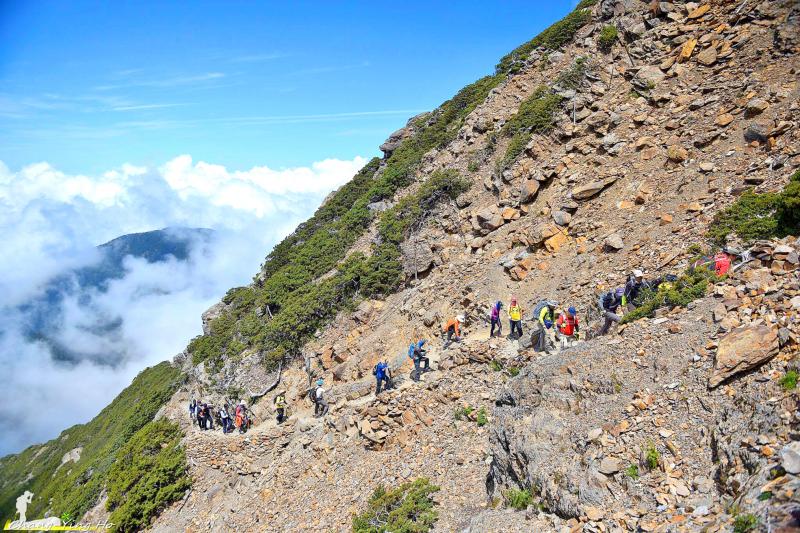
Photo provided by Yushan National Park Management Office
The Taroko National Park saw the largest increase in emergency incidents last year, rising 91.1 percent from 45 to 86 cases, the ministry said.
The sharp growth suggests that many hikers lacked experience and preparation, it said.
People should prepare by training, getting the right equipment, be properly informed, develop risk-consciousness and keep safety regulations in mind before going on a climbing trip, it said.
Climbers and hikers should prepare headlamps, whistles, altitude sickness drugs, GPS-enabled communications equipment and buy insurance, it said, adding that they should bring helmets, snowshoes, and ice axes or tracking poles if snow is forecast.
They should do a triple weather checklist, it said.
This means doing pre-trip research on meteorological and traffic information, double-checking equipment and foul weather procedures with guides and other climbers before an ascent and agreeing on a predetermined point of return in case of unanticipated foul weather, the ministry said.
It is particularly important that hikers be flexible and know when to cancel an ascent, and reassemble at the point of return should foul weather occur in the middle of an ascent, it added.
Hikers are urged to be environmentally conscious and practice “traceless mountain climbing” by making appropriate preparations, setting camp at sustainable sites, collecting waste, leaving the environment in the same state as they found it, minimize the use of fire, be respectful of plant and animal life, and be considerate of others, it said.
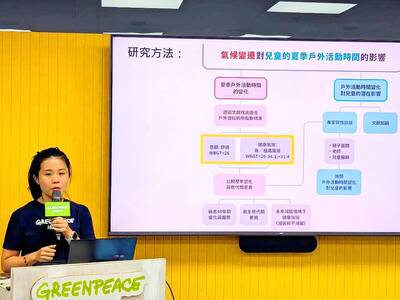
The government should improve children’s outdoor spaces and accelerate carbon reduction programs, as the risk of heat-related injury due to high summer temperatures rises each year, Greenpeace told a news conference yesterday. Greenpeace examined summer temperatures in Taipei, New Taipei City, Taoyuan, Hsinchu City, Taichung, Tainan and Kaohsiung to determine the effects of high temperatures and climate change on children’s outdoor activities, citing data garnered by China Medical University, which defines a wet-bulb globe temperature (WBGT) of 29°C or higher as posing the risk of heat-related injury. According to the Central Weather Administration, WBGT, commonly referred to as the heat index, estimates
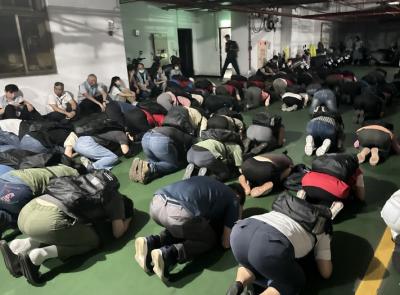
Taipei and other northern cities are to host air-raid drills from 1:30pm to 2pm tomorrow as part of urban resilience drills held alongside the Han Kuang exercises, Taiwan’s largest annual military exercises. Taipei, New Taipei City, Keelung, Taoyuan, Yilan County, Hsinchu City and Hsinchu County are to hold the annual Wanan air defense exercise tomorrow, following similar drills held in central and southern Taiwan yesterday and today respectively. The Taipei Mass Rapid Transit (MRT) and Maokong Gondola are to run as usual, although stations and passenger parking lots would have an “entry only, no exit” policy once air raid sirens sound, Taipei
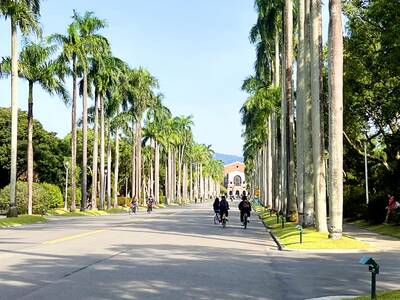
Taipei placed 14th in the Quacquarelli Symonds (QS) Best Student Cities 2026 list, its highest ever, according to results released yesterday. With an overall score of 89.1, the city climbed 12 places from the previous year, surpassing its previous best ranking of 17th in 2019. Taipei is “one of Asia’s leading higher-education hubs,” with strong employer activity scores and students “enjoying their experience of the city and often keen to stay after graduation,” a QS staff writer said. In addition to Taipei, Hsinchu (71st), Tainan (92nd), Taichung (113th) and Taoyuan (130th) also made QS’ list of the top 150 student cities. Hsinchu showed the
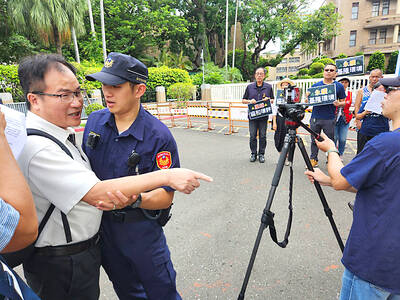
Environmental groups yesterday filed an appeal with the Executive Yuan, seeking to revoke the environmental impact assessment (EIA) conditionally approved in February for the Hsieh-ho Power Plant’s planned fourth liquefied natural gas (LNG) receiving station off the coast of Keelung. The appeal was filed jointly by the Protect Waimushan Seashore Action Group, the Wild at Heart Legal Defense Association and the Keelung City Taiwan Head Cultural Association, which together held a news conference outside the Executive Yuan in Taipei. Explaining the reasons for the appeal, Wang Hsing-chih (王醒之) of the Protect Waimushan Seashore Action Group said that the EIA failed to address